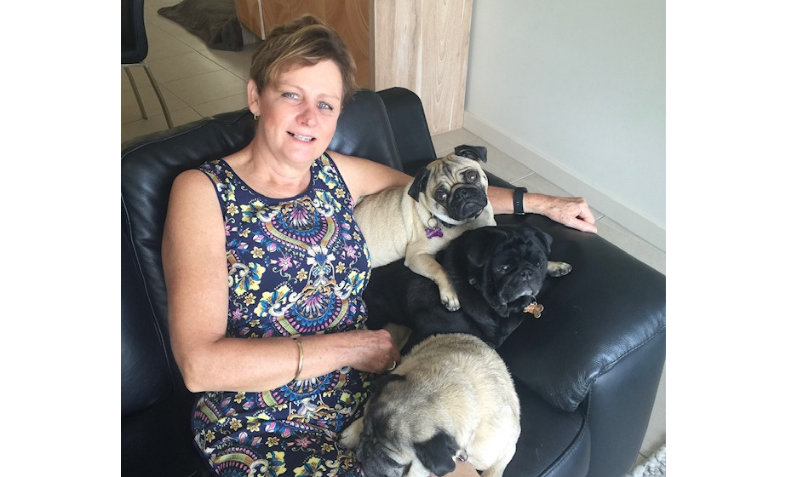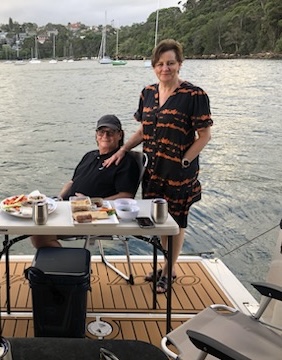When Karen, now 67, found out that her 32-year-old sister had bowel cancer, she was shocked to say the least. The shocks kept coming, however, when her sister’s specialist recommended that then 31-year-old Karen and her younger sister both have colonoscopies to check for cancer themselves.

For Karen this led to the discovery of a 5-centimetre tumour in her bowel, requiring a total colectomy as soon as possible to remove.
Despite it all feeling fairly unlucky, looking back Karen actually considers herself very fortunate to have had a specialist who knew about Lynch syndrome, and saw how it may have been behind her and her sister’s diagnosis at such a young age, as well as their father’s diagnosis when they were children.
‘No one in our family knew that bowel cancer could be hereditary. My father had died at 34 of bowel cancer and none of our doctors had ever said there was this risk to us… I think it was just because it was unknown back then.’
Lynch syndrome is an inherited cancer predisposition syndrome which gives people an increased chance of developing certain cancers across their lifetime, often at a younger age than the general population.
The syndrome is still extremely under-diagnosed, with roughly 90% of carriers unaware of their status. Carriers have an increased chance of developing bowel, endometrial and ovarian cancers (among others) over their lifetime, and have a 50% chance of passing the predisposition on to their children.
The gene variant which causes Lynch syndrome was fortunately not found in Karen’s younger sister but was present in both Karen and her older sister, who sadly passed away from bowel cancer at the age of 38.
‘She always believed that she would be able to beat it. She lived her life to the fullest, and her biggest concern was her two children who she’s very sadly missed by.’
Wary that people with Lynch syndrome face a higher risk of endometrial cancer, Karen and her husband were advised to pursue having a family earlier rather than later. She also worked with her doctor to design a surveillance plan, which she followed every year moving forward.
‘I had annual checkups with the gynaecologist, just to check for endometrial cancer, and it was very lucky that I was doing that because at age 55, one of the tests came back that I actually had endometrial cancer. That probably saved my life, having the ongoing testing.’
Karen had a radical hysterectomy and once again felt she’d dodged a bullet, requiring no further treatment other than her regular surveillance.
Her older sister’s children both tested negative to the syndrome, and in their early 20s Karen’s children had genetic counselling and got tested for Lynch syndrome themselves. Her daughter was negative, but her son tested positive to the gene variation.
‘It was upsetting for the family, but I guess he saw that I was able to navigate my life very easily and that hopefully he would be the same,’ she says.
‘He has a colonoscopy annually now, which was very lucky because one of his early tests showed that he had polyps that had the potential to turn nasty. So, it was lucky that he did get on board… I don't know what his future might have been had he not undertaken those steps.’

Karen’s family has three generations of Lynch syndrome that they know of, with the possibility of it going even further back. To her, the key to living with it has been maintaining a healthy lifestyle, following a surveillance plan, and ensuring your children have their testing when they’re ready.
‘Your children are their own people. They’ll do it in their own time, but you don’t want that time to get to be too late because they are finding the cancers are earlier.’
To people who think they may have Lynch syndrome, Karen insists that the diagnosis is no reason to despair and that it’s knowing which gives you and your family your power back.
‘Don't wait until you possibly might have some symptoms. Be informed and do research,’ she says. ‘That way you can then move forward with your life, with either having Lynch syndrome or not having it. Don't wait, basically.’
If you are diagnosed with Lynch syndrome, her first piece of advice is to communicate with your family so they can be protected.
‘Share your news with your family and your extended family because people need to be aware of the hereditary risk with Lynch syndrome. Start a conversation about possible linked cancers and suggest that family members speak to health professionals to see what their risk factors are.’
She also really encourages people to take charge of their health.
‘Don’t let a busy lifestyle be an excuse to not do your annual surveillance. You're busy, but those appointments need to go into your diary and they're not negotiable.’
Today, Karen is happy to not be facing any health concerns herself or within her family, and to be living a life not defined by Lynch syndrome.
‘We just get on with our lives. We all have a very positive outlook about the future, and we’re happy and healthy.’
Learn more about Lynch syndrome